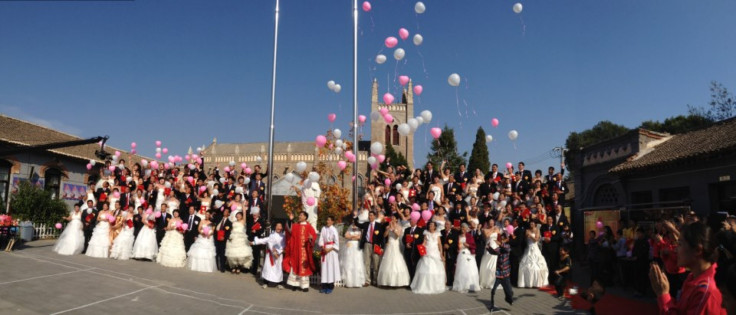Lunar New Year Upstages Valentine's Day In China
This year, Valentine's Day coincides with China's biggest national celebration, the five-day-long official Lunar New Year holiday.
Although some may want to celebrate their love on Feb. 14, there will be no marriages on Valentine's Day in Beijing this year as the city's Civil Affairs Bureau is going on holiday, along with the rest of the country.

The Civil Affairs Bureau announced that because Feb. 14 falls on the fifth day of the celebration, which is still part of the Lunar New Year national holiday, those hoping to file for wedding registries will have to wait. Although a slight delay in obtaining a marriage license is not a big deal, the idea of getting married on the Western-introduced holiday, Valentine's Day, has become increasingly popular over the years.
Almost 4,000 couples planned to sign their wedding contracts on Valentine's Day last year, and even more were recorded doing it the year before, according to the Beijing Morning Post.
Luckily for this year's couples who will be missing out on making Valentine's Day the date of their wedding anniversary, China has its own version of the love-themed holiday: the Qixi Festival. This year, it falls on the seventh day of the seventh lunar month -- and it has grown to be just as commercial as its Western counterpart.
The folk tale behind Qixi, like the story of St. Valentine, was not initially created to explain love. The Chinese tale describes how the Milky Way was created by the Goddess of Heaven to separate two lovers. As the tale goes, one night a year the two are reunited by magpies that fly to the heavens and create a bridge for them to meet: This part of the story has now become the main focus of the celebration.
China's retailers go all-out when promoting their Qixi deals, similar to their U.S. counterparts with their own Valentine's Day-themed commercials. Many of them take to Sina Weibo, China's Twitterlike microblogging site, to promote their deals among the masses of love-struck Web users.
However, common gifts during the celebration differ from the chocolates and flowers considered standard fare in the U.S. In China, retailers get creative with gifts, like last year's popular fireflies, which was trending on Weibo as a "symbol of illuminating love."
Last year, Li Ting, a store owner on Taobao.com, a major online marketplace in China, told the Asia News Network that she saw firefly sales skyrocket. "Usually, we sell hundreds of fireflies every day, but the sales volume increases significantly about a week before Qixi," she said, noting she had sold 20,000 even before the festival.
Another popular trend is expressing commitment through clothing. Young lovebirds have begun buying corresponding clothing and matching outfits as a way of letting the world know they are together.

The matching-clothing trend has taken on a life of its own, as it is now seen on the streets even on noncelebratory days. Retailers sell matching pillows, underwear, cups, watches, and jewelry for couples who want to take their public displays of affection to a new level.

Maybe a Lunar New Year's gift of matching T-shirts will be enough to console Chinese couples who were hoping to make it legal on Valentine's Day this year.
© Copyright IBTimes 2024. All rights reserved.






















